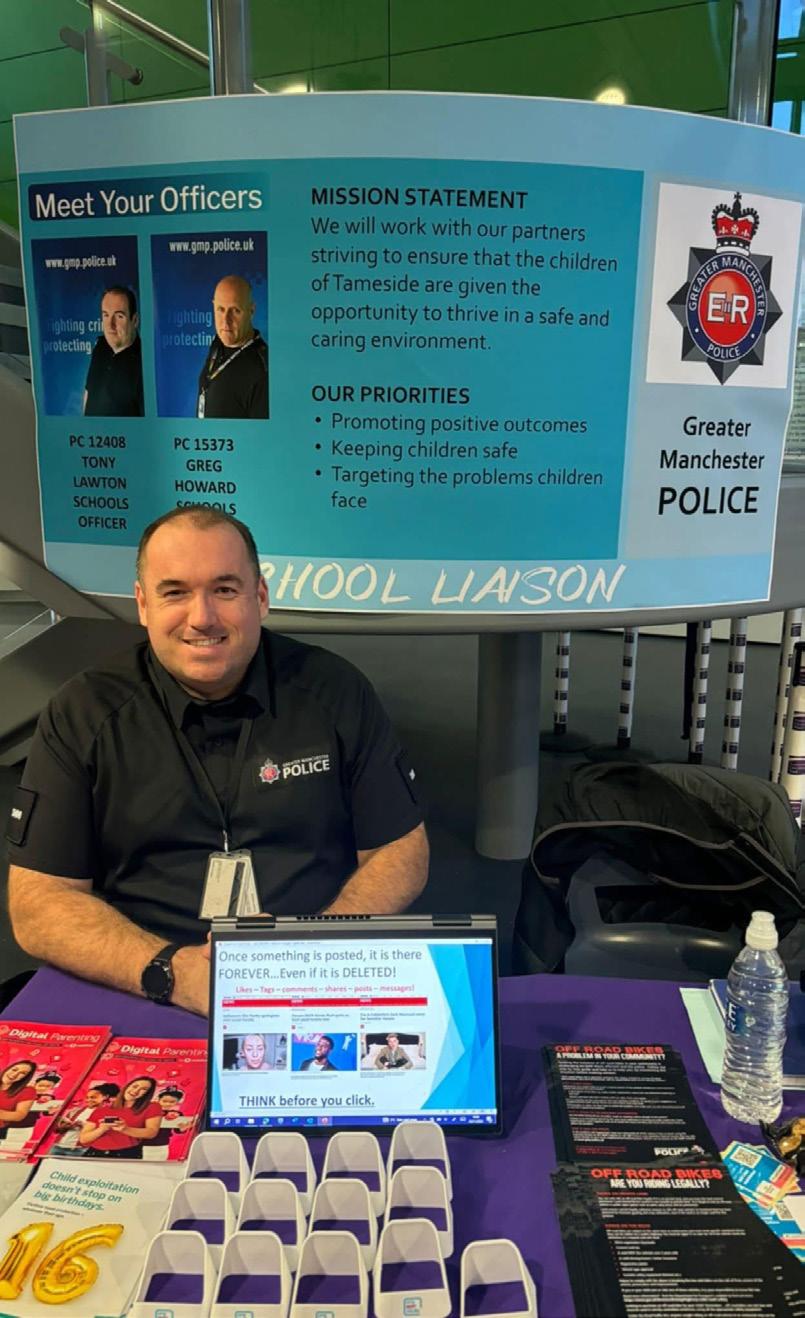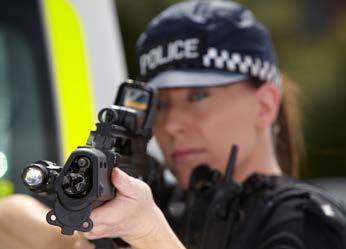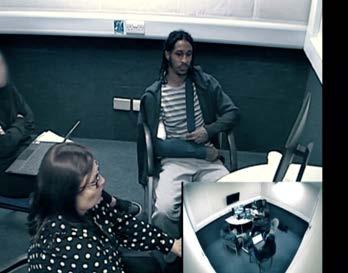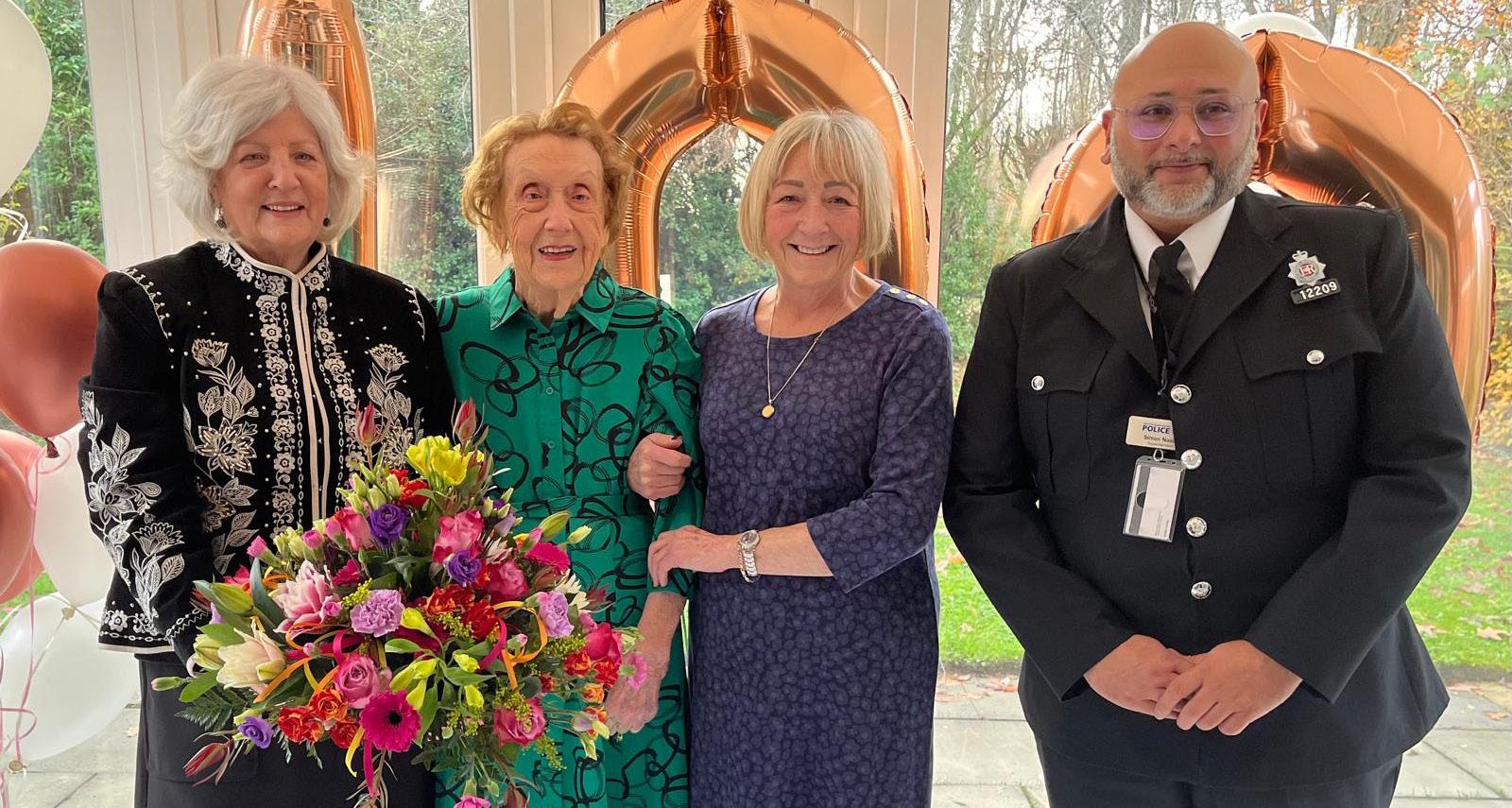












One purpose of this month’s District Brief is to place a focus on the Major Incident Team (MIT) - the team that can support districts from the very beginning of an incident.
The purpose of the MIT is to effectively deal with large or protracted investigations so major crime incidents do not adversely affect local policing teams, as well as providing investigative support to districts dealing with local serious crime. Investigations of this type can require a huge number of resources such as round-theclock monitoring of scenes, numerous pieces of forensic information as well as analysis, which MIT are able to provide and see investigations through to their conclusion.
This can help reduce pressure on district teams as MIT can handle the resourceintensive tasks such as interview strategies, evidence collation and forensic analysis.
This means that local officers on districts can focus on maintaining community relationships which may have been affected by serious incidents of this nature, as well as addressing further district priorities.
Furthermore, their experience in managing major incidents can help ensure cases are handled with precision and therefore, potentially increase the likelihood of securing convictions and delivering justice.
The contribution of MIT also helps to reinforce public trust in policing and is a fantastic demonstration of the importance of collaboration and expertise in solving complex crime.
In Tameside, community policing efforts have been proactive and extensive, focusing on tackling drugrelated crime, enhancing community safety, and ensuring a visible police presence in the area.
On 24 January, a significant operation unfolded in the Waterloo ward of Ashton, where officers from the Neighbourhood Policing Team (NPT), district intelligence unit, and district tasking team executed a warrant. This operation led to the arrest of one male on suspicion of being involved in the supply of Class B drugs.
Earlier in the month, on 22 January, neighbourhood officers from Hyde executed a warrant at a property in Newton. This operation resulted in the seizure of a substantial amount of cash and suspected Class A and B drugs, with multiple arrests made.
Furthermore, on 15 January, officers uncovered five rooms filled with cannabis plants at various stages of growth during a property search in Audenshaw.
The St Michaels neighbourhood beat officers have also been active, seizing a vehicle linked to criminality in the Tameside area based on numerous intelligence reports. On 12 February, the NPT made significant strides by arresting four males, including two under 18, in Dukinfield on suspicion of being involved in the supply of Class A, B, and C drugs.
Community engagement remains a priority, as evidenced by PCSO

Brockett’s efforts on the Harts Mead estate. By knocking on doors and speaking with residents, she provided valuable crime prevention advice and encouraged them to sign up for Bee in the Loop, the community safety initiative. PCSO Brockett intends to return and continue these visits to continue building strong relationships within the community.
Finally, officers from the St Peters ward participated in Hate Crime Awareness Week, attending a community event to raise awareness about hate crime. This proactive approach not only addresses criminal activities but also promotes a safe and inclusive environment for all residents. The ongoing efforts of the neighbourhood teams are crucial in creating a safer, more connected community.

The BBC joined us in the city centre one evening in January, to see how GMP and the hospitality industry are safeguarding young people through increased engagement, education and test purchasing.
Over the course of the evening, we conducted several test purchases at various hotels across the city centre to see how they handled situations of potential exploitation in their hotel. Using a plain clothes officer as a suspect and a volunteer posing as an underage victim, we attempted to book a hotel room to see if the staff could spot signs of child sexual exploitation and take action to safeguard young people.
Overall, we could see that the majority of hotels had a good understanding of child exploitation, as a result of Operation Makesafe training; they challenged the test purchasers and refused to sell them a room before calling the police to report their concerns.
In one instance, employees failed to challenge the test purchasers or report suspicious activity to the police. A full debrief was conducted after this, and further training will be required to help them identify signs of child exploitation and understand the impact that allowing people to book a hotel room in suspicious circumstances can have.
The aim of the operation is to empower hoteliers and employees to feel confident in spotting the signs of potential exploitation happening in front of them and reporting it to the police so that we can act. These operations also help us to understand where there are gaps in the knowledge and training of hotel staff so that we can address these to ensure young people are kept as safe as possible.
Chief Superintendent David Meeney, District Commander for Manchester, said: “It is vital that we raise awareness amongst key local businesses as well as members of the public so they
can learn what to look out for, spot the signs, and ultimately help safeguard young people. Sometimes there may be a perfectly innocent explanation for a situation, but if we can protect even one vulnerable young person from harm, this initiative will have been worthwhile.”
Indicators of child sexual exploitation within the hospitality sector include, but are not limited to:
• Adults who appear secretive about their visit or try to conceal that they are visiting in the company of a child or young person.
• Arrival of young person with a boyfriend/girlfriend who appears older than they are.
• Refusal to provide identification or credit card details and attempting to pay in cash.
• Requesting an isolated room, a room close to a fire exit or a room with easy access to the car park.
• High levels of visitors to a guest room.
• Visitors arriving and asking for a specific room number without knowing the name the room is booked under.
• Refusal to have room cleaned or visited.
• Pre-paid bar tab or consumption of pornographic film channels in a room occupied by a child or young person.

As part of our ongoing drive to improve the way we engage with vulnerable victims and witnesses, including children, GMP will shortly launch a new process for arranging and conducting video interviews with children and vulnerable adults.
Ahead of the rollout of the new process, training sessions will be provided for anyone whose role involves dealing with victims and witnesses, including response, DIT, CID and CPIU.
The training will take place between Monday 10 and Friday 14 February, with sessions on each day from 10am to 11am and from 2pm to 3pm.
Each session will take around an hour, with training followed by a Q and A; the training will count towards continuous professional development (CPD) hours for detectives.
You can view a full list of links to each training session by scanning the QR code below.



As Right Care, Right Person (RCRP) moves into its second wave, we spoke with Bradley Sone, a call handler at Claytonbrook FCCO, about the implementation of the initiative and its progress so far.
How do you feel about RCRP so far?
So far the introduction of RCRP in GMP has had a huge impact. There was a lot of worrying prior to launch, but the whole team seems to be on board now making sure the callers are directed to the most appropriate agency to help them. As a force we have had a drop in deployments to concern for welfare calls, freeing up patrols to go to other incidents; there has also been a drop in the number of concern for welfare jobs received from partner agencies, which are now more likely to contact the more appropriate agency as their first point of call.
What aspects have been positive for you?
For me the most positive aspect of RCRP is getting the caller the help they need. For so long the police have attended everything to try and help as best they can, but with this new process now in place the people of Greater Manchester can get the right help that they need.
What challenges have you encountered with RCRP since it was implemented?
My team specifically struggled with the changes to the missing persons policy [Operation Addition] rather than RCRP itself –they were both big changes to two big parts of call handling, and the missing policy change seemed to not be shouted about as much.
How did you overcome these challenges? Who or what helped you?
We communicated any challenges we encountered to the RCRP senior leadership team (SLT) and the subject matter experts (SMEs) in the room, who made amendments to the policy where appropriate and communicated changes so the new information could be filtered down. Throughout the whole implementation of RCRP there has been a lot of help and support available from the SLT and the SMEs.
How do you think the public feels about RCRP?
Members of the general public who I have spoken to or assisted with jobs all seemed happy with the change; a lot of the time on calls I have found that people were just unaware of who else they could call so they called the police, but when we pass on advice for who else to contact, they are happy to follow it.
What do you hope to gain from RCRP in the future?
By continuing with RCRP, we can continue to get the people of Greater Manchester the right help. As a result of fewer deployments for concern for welfare calls, we can attend more jobs in a given timeframe.
Are there any specific improvements or outcomes you are looking forward to?
The policy continues to be updated as we continue working with RCRP. The changes so far have all been appropriate, they haven’t added any extra work to the control room, and the room as a whole is more confident with RCRP. I cannot think of any specific improvements needed at this time.
GMP’s Association of Women in Policing (AWP) will be holding an International Women’s Day event on Friday 7 March 2025 at GMP Force Headquarters.
The event, which will take place in room 515 of FHQ from 9am to 3pm, will be opened by ACC Steph Parker and feature presentations from:
• Police History Society chair and former senior Metropolitan Police officer Kate Halpin QPM on the diverse history of women in policing
• Renowned academic Dr Sajjan Gohel on the role of misogyny in the ideologies that drive terrorism
• GMP Det Insp Hayley Riley and Ch Supt Colin McFarlane on the importance of workplace mentoring and female representation at the board level

• GMP leadership trainer Rebekah Renshaw on professional development within policing
• Ruth O’Malley, head of data science at Counter-Terrorism Policing, on the value of police staff in complex investigations
Attendees will be able to visit stalls for support networks and bodies both within and outside GMP, and network with female colleagues from across the force. Food will be provided, with vegan and halal options available.
If you’re interested in attending the event, please email AWP@gmp.police. uk with your rank and division.
There are only 50 places available at the event, so get in touch as soon as you can!






A new statutory Victims’ Code is now in effect, placing mandatory requirements on all police forces and criminal justice partners to provide consistent, high-quality support to victims throughout their journey through the criminal justice system.
In order to help embed the Code into GMP practice at all levels, for both police officers and staff, ACC John Webster (Criminal Justice and Custody) and Victims’ Services strategic lead Louise Sever have put together a video that provides a high-level overview of what the changes mean for us as a force
ACC Webster said: “These changes represent a major step forward in how we support victims of crime.
“The new Code puts clear obligations on us to provide better information, support and communication to victims, while working more closely with our partner agencies.
“Every contact with a victim is an
opportunity to build trust and confidence in policing.
“These new requirements will help ensure we provide consistent, professional support to every victim we encounter.
“Remember, supporting victims effectively isn’t just about following a code – it’s about providing the professional, empathetic service that victims deserve and that builds public confidence in policing.”
Key changes which officers and staff should be aware of include:
• A broader definition of ‘victim’ that includes those who have witnessed crime, those whose birth resulted from criminal conduct, those who have lost a close family member to crime, and children who are victims of domestic abuse.
• Mandatory compliance with the Victims’ Code, requiring us to provide specific services unless there are good reasons not to.
• New requirements to collect and share data about victim services with other criminal justice agencies.
• Specific obligations around notifying schools when we believe a child may be a victim of domestic abuse.
• Enhanced information sharing framework with clear guidelines on handling victim information.
You can view the video by scanning the QR code below.

The post-incident procedure (PIP) is a national process designed to guide GMP officers and staff who have witnessed or been involved with a death or serious injury (DSI) of persons following police intervention or contact, where there is no suggestion of misconduct or wrongdoing on behalf of the GMP employees involved.
The procedure is in place both to enable officers and staff to provide any independent inquiry with the best evidence that they can and to ensure that the welfare of any GMP officers or staff members involved in an incident of this kind is prioritised at all stages of the process. It has welfare at its core and offers an element of protection
to officers who have often acted with nothing but courage and professionalism in extremely challenging circumstance.
All GMP officers and staff should ensure they are aware of the PIP and how it works – DSI incidents could affect anyone, public-facing or otherwise, and irrespective of their role or rank.
Our Creative Media Imaging team has produced an informative video covering the key aspects of the PIP, to give you an element of confidence in the process in case you are ever involved in an incident in which a member of the public has either been killed or seriously injured.
You can watch it by scanning the QR code to the right.
Please be aware that the video contains graphic footage which some viewers may find upsetting or distressing.


The latest season of Channel 4’s behind-the-scenes documentary series Manhunt, which aired through January, focuses on teams at GMP as they investigate a series of cases.
The programme, which has been described as ‘absorbing…a low-key tribute to diligent police work’ by the i and ‘gripping’ by the Daily Mail, follows the progress of Operations Feverfew (investigating the February 2022 kidnap and murder of Christopher Hughes), Southsea (the hunt for the killers of Neri Morse, who was stabbed in Ancoats in November 2022) and Bure, which sees officers respond to intelligence that a man is planning to attend a large public event with a gun.
Op Feverfew, the subject of the first


episode of the series, is the complex investigation into the kidnap and murder of Christopher Hughes in February 2022. The documentary crew follows the work of DI Justin Bryant and his team at GMP’s Serious and Organised Crime Group following an initial 999 call reporting a man being forced into a car in Wigan, as they piece together evidence and deploy resources to locate Christopher and his abductors. Once a body is found, the missing persons case becomes a murder investigation; and the team must uncover what happened – and why.
The second episode follows Operation Southsea, which sees the Major Incident Team spring into action when a stabbing on a busy street in broad daylight leaves


24-year-old Neri Morse dead and three suspects nowhere to be found. The team calls in specialist intelligence officers to track the fugitives before they strike again.
The third and final episode focuses on Operation Bure, an investigation into intelligence that a man was planning to attend an event with a gun. In the space of only a few hours, officers must respond proactively and dynamically to locate the potential offender and mitigate any threat he poses to the public.
Every episode of Manhunt is now available to stream at https://www. channel4.com/programmes/manhuntdocumentary.


GMP’s ongoing evidential property management (EPM) streamlining project was introduced to support with the reduction of serious risks to the retention and accessibility of evidential property across the force. One key area of focus is the significant volumes of destruction backlogs being held across the force, with around 44,000 evidential holdings currently awaiting further action or disposal. Backlogs like this significantly increase the risk to GMP, and therefore a key focus has been placed on streamlining and stabilising the EPM stores and their content.
Under the EPM ‘streamline and sustainability’ plan, a performance dashboard was created to support with the identification of high risk and priority areas within the evidence property management system, ensuring that the project team was dealing professionally



with the management of evidence, to safeguard its integrity in support of the prevention, reduction and detection of crime, keeping people safe, and caring for victims. Weekly SPOC meetings were introduced to share challenges, review ideas and ensure urgent actions were reviewed regularly.
These initial solutions will now be followed by a series of localised days of action, which will see some evidence storage facilities temporarily close for a few days to allow the project team, EPM store staff and divisional officers work collaboratively to reduce existing backlogs. On the first of these, a ‘proof of concept’ session at Oldham which began on Monday 27 January, the team was able to reduce the current backlogs from 3,595 destruction items to 633 over a three-day period.
Senior Change Project Manager Lisa Semple, who is overseeing the project,

said: “We’re already very pleased with these initial results, and we’re looking forward to further successes throughout the first half of 2025.
“The Oldham day of action follows on from a series of SPOC-led actions in 2024 which saw reductions in disposals of 60% at Longsight; 55% at West Didsbury; 47% reduction at Oldham and 43% at Wigan. Our overarching goal is to reduce the 44,000 holdings down to around 9,000 items.”
The days of action will be complemented by the introduction of proactive stock management practices aimed at preventing backlogs from building up again, including the introduction of standard operating procedures, store targets, daily performance meetings and a weekly Gold meeting to track store performance and identify early on any challenges which may pose a risk to backlog volumes.



In late January, a GMP officer was seriously injured when a vehicle hit her at speed while she was investigating to a report of suspicious behaviour in Cheadle. A man has been arrested on suspicion of attempted murder.
Ch Insp John Picton of the Stockport district said: “This incident is truly shocking and shows how quickly situations our frontline officers attend can escalate. Our officers go to work every day to provide an outstanding service to the communities they serve, and achieve fantastic results in situations that are often challenging. Our investigation is continuing and the officer is being supported by all of us at the Stockport district; she is recovering well.”
From September 2018 to September 2023, the number of assaults on police constables in England and Wales rose from 28,668 to 42,424 incidents: an increase of 48 per cent. In the same period, assaults on officers resulting in injury increased by 14.8 per cent.
It’s important to remember that any assault or hate crime that happens to you while you are on duty is a serious matter. Being assaulted or abused at work is not normal; it’s not acceptable; and it is absolutely not just ‘part of the job’. Oscar Kilo’s Operation Hampshire aims to prioritise officer and staff wellbeing by ensuring that officers and staff who have been attacked are
taken seriously as victims and that the impact of every assault is considered, regardless of injury. It provides guidance, strategy and resources both for officers and staff who have been attacked while working, and for their supervisors and line managers.
Sometimes when we experience a traumatic event – such as being assaulted or subjected to a hate crime – the full impact of what has happened doesn’t hit us until days or weeks afterwards. The psychological effects of being attacked at work are often more insidious, and can last far longer, than the physical injuries. Different people experience and respond to trauma in very different ways and with varying levels of resilience, formed by their own individual experiences; and there is no right or wrong way to experience trauma.
GMP recognises that the wellbeing of our officers and staff is paramount to maintaining a strong, effective police force, and we want to ensure that every officer or member of staff who is attacked while at work is treated like any other victim of a crime – that they have meaningful support, regular contact from the team investigating their case, and that the support that they receive has oversight at a senior level. Operation Hampshire is a national initiative offering the necessary strategy and guidance to help forces respond effectively to assaults on police officers
and staff, enabling us to get the basics right for our colleagues when they need us most.
At the heart of Operation Hampshire is a seven-point charter that continues to guide our approach:
1. Assaults on police officers and staff should be investigated with the same care, compassion and commitment as an assault on a member of the public.
2. The Victims’ Code of Practice (VCoP) applies to all victims of crime, including police officers and staff.
3. The assaulted officer must never be the officer in charge (OIC) for the investigation into their own assault.
4. Victims recover better and more quickly if they receive appropriate support.
5. The supervisor must ensure that the district commander or head of department is informed to provide continuity of welfare support.
6. The victim of the assault and/or the line manager should ensure that Form 700B is completed as soon as possible after the event and sent to the Health and Safety Unit.
7. To achieve a successful prosecution, the best evidence should be provided.
You can learn more about Op Hampshire, including information and resources for victims of crime, their supervisors and SLTs, on our dedicated intranet hub at Home > Operational support > Operation Hampshire.
On 25 November 2024 Kathleen Cotton, widow of former GMP sergeant Alan Cotton, celebrated her 100th birthday. To celebrate the occasion, Kathleen was visited by chair of the Manchester branch of the National Association of Retired Police Officers (NARPO) Sandie Wilde and treasurer Maureen Graham, with flowers and a gift; as well as CoM Supt Simon Nasim, who brought a personally written card from GMP Chief Constable Stephen Watson QPM, who was unable to attend.
Sandie said: “Kathleen is still very active. She was a teacher at a local primary school, and while out and about she is still approached by former pupils who have now retired!”
Sgt Cotton, who served with GMP from around 1950 to around 1980 before going on to work in Eccles courts, is well remembered as a great character. During his policing career, he was the recipient of a bravery award for rescuing a man from one of the highest buildings in the city.



Across the district, officers and staff do a fantastic job in keeping communities safe; however, they cannot do it alone which is where our partners come into the picture.
This type of joined-up working means we have access to services and technologies such as a vast network of CCTV cameras.
Tameside Council’s CCTV network has over 300 cameras monitoring town centres, parks, public spaces and council buildings.
Recent figures highlighted that in January alone, the team working tirelessly monitoring these cameras provided information to officers and staff that led to 20 arrests and located seven people who were vulnerable and/ or missing from home.
During 2024, they provided information that led to 52 arrests and helped locate 27 people who were vulnerable, however
these figures represent just a fraction of the incidents where the council’s CCTV operators assist GMP daily.
Tameside District Commander Chief Superintendent Chris Foster said: “The CCTV team are a key partner in our efforts to keep the community of Tameside safe. They are the unseen eyes who provide us with a retrospective look at incidents, identifying potential offenders when incidents are reported to us, but more importantly a proactive response to issues to which we can provide an immediate response before they escalate.
“I have personally witnessed the great communications between CCTV and our officers, and they often provide the oversight and direction when officers may be involved in a foot pursuit or similar. A recent example of great work by the CCTV team is reporting a theft of a charity box from a restaurant, which

no one had even noticed, and they directed officers to the suspect who had left the scene and was walking through the town centre. This is one of the many incidents that are reported to us by the team, and I can’t thank them enough for their attention to detail and assistance in preventing and fighting crime within our district, making it a safer place to live.”
Throughout February, GMP alongside other UK police forces and law enforcement agencies ran a national firearms amnesty for Turkish manufactured Top-Venting Blank Firers (TVBF).
Although these firearms may have been lawfully purchased originally, they are now illegal under the Firearms Act 1968. People could hand these into stations across Greater Manchester, and if done during the month of February, it would not result in criminal prosecution.
However, after the amnesty period, anyone found to be in possession of a TVBF could face prosecution and to up to 10 years’ imprisonment.
What is a TVBF?
TVBFs are guns designed to fire blank cartridges only, featuring a fully blocked barrel. In the UK, these weapons could previously be owned without a licence unless classified as ‘readily convertible.’
However, recent findings indicate a rising connection between these firearms and criminal activities, such as intimidation and mimicking genuine handguns. Over 10,000 TVBFs are estimated to be in circulation in the
UK, and have been used in several serious, criminal incidents, including four murders.
The models people are being asked to hand over are top-venting blank firers manufactured by any of the following:
• BLOW
• CEONIC
• EKOL
• RETAY
Other firearms can be surrendered during this period, as can all brands of blank firers, converted or otherwise.

Call handler thanked for her ‘outstanding commitment to accessibility and trauma-informed care’
Call handler Karolyn Schofield was thanked by a grateful member of the public for her understanding of their needs during a call recently.
The caller said: “Throughout our interactions, Karolyn demonstrated a deep understanding of the challenges faced by vulnerable individuals and consistently went above and beyond to create a safe and supportive environment.
“Karolyn was incredibly proactive in ensuring accessibility for me -she provided materials in alternative formats, offered flexible scheduling, and readily adapted to my communication needs.
“Karolyn’s communication style was exemplary. She was patient, empathetic, and clearly knowledgeable about traumainformed practices. She used clear language, checked in with me regularly about my comfort level, and created a space where I felt safe to share my experiences.
“Karolyn’s efforts have had a profoundly positive impact on my experience. She is a shining example of how to create an inclusive and empowering environment for all.
“She made me feel seen and
supported, and I’m so grateful for her understanding.”
Off-duty officers commended for their actions
The actions of off-duty officers NPO Daniel Wilson and Sgt Stephen Naylor were commended by a member of the public following ‘their exceptional conduct and dedication to public safety’ while at an Ashton United FC home game on New Year’s Day.
During the match against FC United of Manchester, an incident unfolded in the bar area involving a visiting fan who became increasingly aggressive, vocal and unpredictable as the day progressed.
Despite the stewards’ best efforts to calm the individual, the situation escalated. Recognising the potential for further disorder, the bar manager requested the assistance of PC Wilson and PC Naylor, who were attending the match as spectators.
The person attending the match said: “Both officers responded swiftly and without hesitation. They entered the bar area, successfully diffused the volatile situation, and restrained the individual, escorting him off the premises. Their professionalism, courage, and composure prevented the incident from spiralling into a more serious disturbance.
“It is important to note that both
PC Wilson and a steward were assaulted during the intervention, yet the officers remained focused and resolute in their actions, prioritising the safety of those present. Their willingness to step into a difficult situation while off duty speaks volumes about their commitment to public service and the values upheld by Greater Manchester Police.
“On behalf of all those who were present at the match, I would like to express my gratitude for the decisive and selfless actions of PC Wilson and PC Naylor.
“Their conduct is a credit to themselves, the force, and the community they serve. The officers responded without fear for their own safety and prevented an escalation. Their swift actions should be commended.”
Officer thanked for reassuring visit NPO Scott Higginson was thanked for a visit he paid to an elderly Manchester resident recently.
The resident’s grandson said: “Thank you for coming to visit my grandad. You helped to reassure, offer guidance and answer all our questions. You were professional from the start and made my grandad feel at ease.
“You showed great interpersonal skills, you listened and were nonjudgemental. Thank you.”
Across the district, officers and staff are committed to working with communities to ensure they are supported.
A recent example of this saw over 20 seized bikes donated to the Tameside youth work programme at the beginning of February.
The bikes will now be disaseembled into their salvageable parts, re-built and re-purposed by local youngsters who will benefit from owning their own means of transport.
This will help to teach them useful bicycle building and maintenance skills at the same time.
If you have any community stories
like this one to share, please feel free to get in touch with the District Brief team - jessica.allen-millbank@
gmp.police.uk and georgia.holland@ gmp.police.uk.
